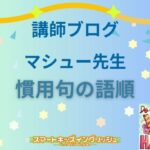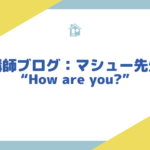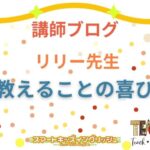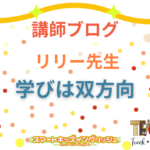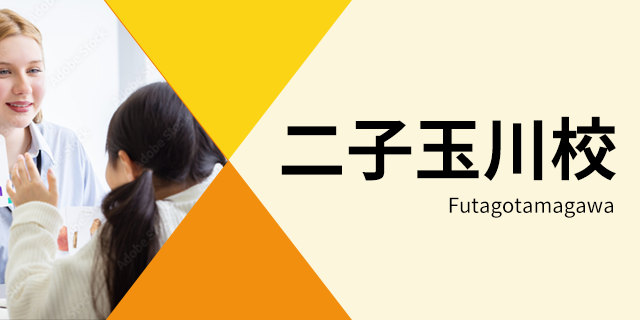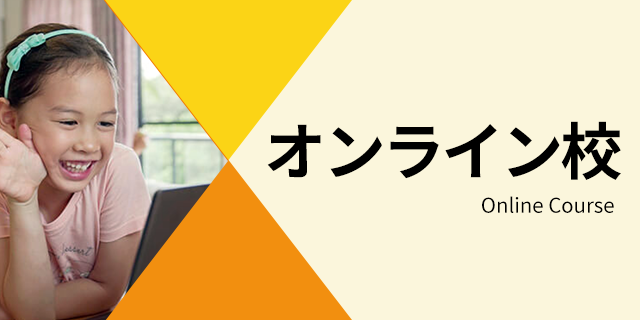(下に日本語訳があります)
As a teacher at Smart Kids English, I’ve had the unique opportunity to work with Japanese students who have recently returned from living in English-speaking countries. These students often come to class with an interesting mix of fluency, confidence, and frustration. They’ve spent months or years abroad communicating in English, and upon returning to Japan, many of them feel like they’ve left a part of themselves behind. Lots of them tell me they feel happy and relieved to talk in English again.
One of the most common things I hear from these students is how much they enjoy speaking English—not just for practical reasons, but because they feel they can express themselves more freely. English, for them, is more than a second language. It has become a tool for self-expression.
Students returning from abroad often have strong opinions and diverse experiences they want to share. In a one-on-one setting, lessons can be tailored to their interests—whether it’s discussing current events, reflecting on their time abroad, or practicing English they’d use in international settings.
They often tell me that, in Japanese, communication can often be indirect, shaped by cultural norms around politeness and harmony. In contrast, English gives many students the space to be more open, assertive, and creative with their opinions. They’ve gotten used to saying exactly what they mean, and they enjoy the directness that English allows.
As their teacher, my goal is to help them stay connected to that expressive version of themselves. In our lessons, I encourage opinion-sharing, debate, and personal storytelling—anything that brings back the sense of freedom they felt while living abroad. These students often thrive when they’re given the chance to be more than just “correct” in English—they want to be authentic.
Teaching these returnees is a rewarding challenge. They remind me that language learning is not just about grammar and vocabulary; it’s about identity, expression, and belonging—no matter which country you’re in.
Matthew
Smart Kids Englishの教師として、英語圏の国から帰国した日本人の生徒たちと関わるという特別な機会に恵まれています。生徒たちは、英語での流暢さ、自信、そして何かフラストレーションが入り混じった興味深い状況を抱えて授業を受けに来ます。何ヶ月、何年も海外で英語でコミュニケーションをとってきたため、日本に帰国すると、まるで自分の一部をどこかに置いてきぼりにしてきてしまったような気分になっている生徒が多いと感じます。このスクールに通うことで、多くの生徒は、再び英語で話せるようになったことに喜びと安堵を感じていると私に話してくれます。
これらの生徒たちからよく聞くのは、英語を話すことがどれほど楽しいかということです。単に実用的な理由だけでなく、英語がより自由に自分を表現できる言葉だと感じるからだそうです。つまり彼らにとって、英語は第二言語以上のものなのです。自己表現のツールとなっているのです。
帰国子女の生徒たちは、しばしば強い意見をもち、多様な経験を誰かと共有したいと思っています。マンツーマンの授業では、時事問題について議論したり、海外での生活を振り返ったり、国際的な場で使える英語を練習したりなど、生徒の興味に合わせてレッスンをカスタマイズすることができます。生徒たちは日本語では、礼儀正しさや調和といった文化的規範に縛られることが多く、コミュニケーションが間接的になりがちだとよく言います。対照的に、英語では多くの生徒がよりオープンで、主張的で、創造的に意見を述べる余地があります。彼らは自分の言いたいことを正確に言うことに慣れており、英語ならではの直接的な表現を楽しんでいます。
教師としての私の目標は、彼らが表現力豊かである自分自身を尊重し続けられるように手助けをすることです。レッスンでは、意見の共有、議論、個人的なストーリーテリングなど、海外で感じていた自由な感覚を呼び起こすようなことを奨励しています。そうすることで生徒が、英語で「正しい」だけではなく、ありのままの自分でいる機会を与えられることで人間的に成長していくことが多いのです。彼らは、ありのままの自分でいたいと思っているのです。
これらの帰国子女を教えることは、やりがいのある挑戦です。彼らと接することで言語学習は、文法や語彙だけでなく、アイデンティティ、表現のしかた、そして帰属意識にもとづくものなのだということを私に教えてくれます。たとえどの国にいたとしても。
マシュー先生:先生紹介

